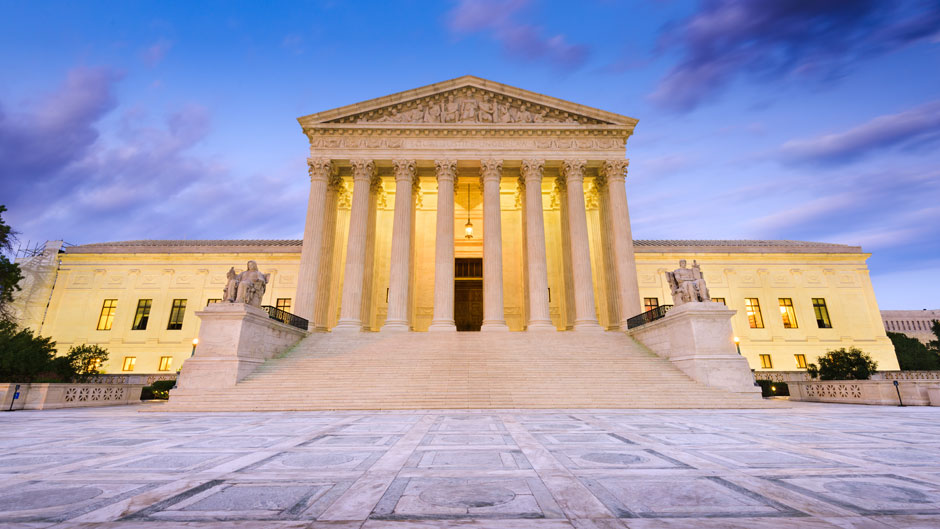The landmark decision came early Monday, with faculty members at the University of Miami School of Law already well into their day: In a 6-3 vote, the U.S. Supreme Court ruled that the historic 1964 Civil Rights Act protects lesbian, gay, bisexual, and transgender employees from discrimination in the workplace, giving a major victory to the LGBTQ civil rights movement.
The court ruled that Title VII of the Civil Rights Act, which prohibits employment discrimination based on race, color, religion, sex, and national origin, also covers sexual orientation and gender identity. And what was surprising was that two of the court’s conservative justices—recent appointee Neil Gorsuch and Chief Justice John Roberts—joined the court’s liberal bloc in the majority ruling.
“Many of us who have worked on these issues were predicting a loss, so a 6-to-3 victory, with a strong majority decision written by Justice Gorsuch, came as a welcome and unexpected surprise—even a shock,” said Anthony E. Varona, dean and the M. Minnette Massey Professor of Law.
“I am fiercely proud that a number of Miami Law professors were scholarly pioneers, showing how the prohibition on sex-based discrimination under Title VII should apply to sexual orientation and gender identity,” Varona added.
In Monday’s ruling, the court considered two cases regarding gay rights, Bostock v. Clayton County, Georgia and Altitude Express Inc. v. Zarda, and one case concerning transgender rights, R.G. & G.R. Harris Funeral Homes Inc. v. Equal Employment Opportunity Commission.
“Justice Gorsuch, writing for the court, was right in concluding that sexual orientation and gender identity discrimination is ‘exactly what Title VII forbids.’ That is what many of us have been saying, and writing, and teaching for many years,” said Varona, who served as the first general counsel and legal director for the Human Rights Campaign, the nation’s largest LGBTQ civil rights organization, which has been working toward federal civil rights protection for LGBTQ Americans for decades.
The vast majority of the country already supports employment protection for gay and transgender workers, said Caroline Mala Corbin, professor of law and Dean’s Distinguished Scholar at the University of Miami, “so the Supreme Court is not so much a trailblazer as it is catching up to popular opinion.”
“But now that it is illegal for employers to discriminate against an employee because they are gay or transgender, I would not be surprised to see a flood of employers claiming Title VII violates their religious liberty,” Corbin said.
Varona weighs on other important aspects of Monday’s landmark SCOTUS ruling:
How surprising is it that two of the more conservative justices on the court—Gorsuch and Roberts—joined the court’s four liberal justices in this landmark ruling? And does that signal what can be expected in future highly charged cases?
Courts are political institutions. Supreme Court justices, despite their independence and lifetime appointments, tend to resist counter-majoritarian impulses, especially where public opinion strongly disagrees with the direction of the court’s reasoning. In the case of the LGBTQ movement, we have seen so much progress over the last four decades largely because those of us who are lesbian, gay, bisexual, and transgender came out to our families, coworkers, friends, and neighbors. We became visible in the media, in our schools, in the boardrooms, in our places of worship, at city hall and in courthouses, at neighborhood gatherings, and most importantly, at the Thanksgiving table. The straight people around us started to see us as valuable, contributing, and whole members of our communities, and then joined us in demanding basic fairness and equality. This is as much a victory for our straight allies as it is for us. The court, in this instance, could not ignore that LGBTQ Americans help comprise the fabric of this diverse nation, and that most Americans agreed with our demand for fairness and basic protections against employment discrimination.
All that said, in concluding that “[s]ex plays a necessary and undisguisable role in the decision” of “whether an employer can fire someone simply for being homosexual or transgender,” Justice Gorsuch engaged in a rigorous textual analysis going well beyond politics and public opinion. He also rejected the argument made by other courts and the dissenting justices that the question of Title VII protection for LGBTQ Americans was one for Congress and not the Supreme Court to resolve. He wrote: “When the express terms of a statute give us one answer and extratextual considerations suggest another, it’s no contest. Only the written word is the law, and all persons are entitled to its benefit.”
What more still needs to be done to advance the rights of the LGBTQ community?
Bostock joins 2003’s Lawrence v. Texas, which decriminalized same-sex sexual intimacy, and 2015’s Obergefell, the marriage equality case, as among the most influential decisions advancing the LGBTQ civil rights movement. But we have much more to do. Anti-LGBTQ discrimination in housing, health care, education, public accommodations, and elsewhere remains a serious and pervasive problem post-Bostock. Access to safe schools and fair participation in athletics programs are still areas of concern and litigation. We continue to insist on the physical safety of LGBTQ people, and especially transgender women of color, who are particularly vulnerable. We remember that early flashpoints in the LGBTQ movement—like 1966’s Compton’s Cafeteria Riot and 1969’s Stonewall Rebellion—were acts of resistance against discriminatory and abusive policing, and we recognize the rich racial diversity in our movement. The struggle against racist police brutality, therefore, is an LGBTQ issue. Bostock is a landmark decision, and today will go down as a historic day in the LGBTQ movement, but we have much yet to accomplish. We celebrate today. But the work continues tomorrow.

